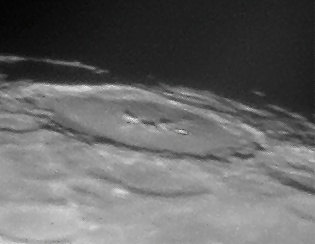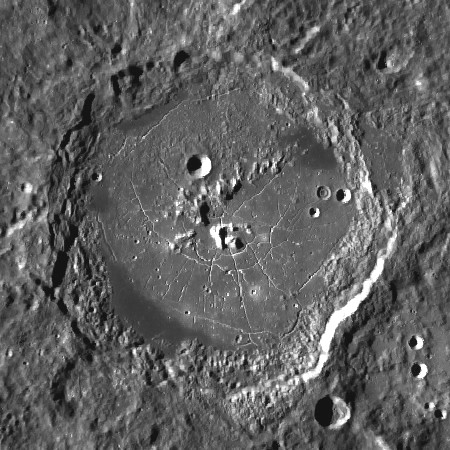Humboldt
Contents
Humboldt - and concentric crater N°13 on its floor
|
Lat: 27.0°S, Long: 80.9°E, Diam: 189 km, Depth: 5.16 km, Rükl: 60, Upper Imbrian |


Upper telescopic image: Mardi Clark .
Lower orbital image: LROC. Note the crackled appearance of the southern part of Humboldt's floor, and also the Concentric Crater (CC) near the eastern part of Humboldt's rim.
Images
LPOD Photo Gallery Lunar Orbiter Images Apollo Images Kaguya HDTV
- The Hi-Res scan of Lunar Orbiter 4's photograph LOIV-027-h1 shows the Concentric Crater on Humboldt's floor very well! This Concentric Crater is the 13th item in C.A.Wood's list published in 1978.
- AS12-50-7412 is one of Apollo 12's oblique orbital high-sun views of Humboldt's Concentric Crater.
- AS15-93-12640 is the first one in a series of Apollo 15's orbital Humboldt-photographs (Magazine 93-P). Note the Concentric Crater near the photograph's upper margin!
- AS15-93-12653, in the same magazine (93-P), is an oblique view of Humboldt's central peak and radial rille system.
Research Lunar Orbiter and Apollo photographs: Danny Caes
Maps
(LAC zone 99C1) USGS Digital Atlas PDF
Description
Description: Elger
(IAU Directions) W. HUMBOLDT.-- Though close to the limb, this enormous wall-surrounded plain, some 130 miles in extreme length, and estimated to have an area of 12,000 square miles, is well worth observing under suitable conditions. It ranks among the largest formations of its class, and in many respects resembles Bailly on the S.W. limb. At one point on the W. a peak rises to 16,000 feet, and on the opposite side there are peaks nearly as high. The floor contains some detail--a crater, nearly central, associated with ridges, and two dark spots, one at the S. and the other at the N. end.
Description: Wikipedia
Additional Information
- Depth data from Kurt Fisher database
- Westfall, 2000: 5.16 km
- Cherrington, 1969: 4.69 km
- Radar brightat 70 cm.
- Exterior impact melt deposits to SE & ENE, max of ~100 km beyond rim. Most extensive ejecta, rays and secondary craters to the SSE, with max wall slumping on NNW side of crater, and topographically lowest rim crest to S & ENE (Hawke and Head, 1977).
- Concentric crateron floor.
- Floor fractures- JohnMoore2
- TSI = 30, CPI = 25, FI = 25; MI =80 Smith and Sanchez, 1973
Nomenclature
- Friedrich Wilhelm Christian Karl Ferdinand Freiherr von Humboldt(June 22, 1767 – April 8, 1835), government functionary, diplomat, philosopher, founder of Humboldt Universität in Berlin, friend of Goethe and especially of Schiller, is especially remembered as a German linguist who introduced a knowledge of the Basque language to European intellectuals.
- This crater is shown as W. Humboldt on older maps, and was named for Wilhelm von Humboldt rather than for his more famous naturalist brother Alexander. The brother is commemorated with Mare Humboldtianum. - JimMosher
- Not to be confused with John Houbolt (1919-2014, aerospace engineer, key figure in NASA's Apollo program).
- Somewhere east of Humboldt should be a crater which was called Whitaker by Hugh Percy Wilkins and Patrick Moore, but the I.A.U. did not accept that name.
- Could we call the cobweb-shaped system of "cracks" on Humboldt's floor Rimae Humboldt?
- Humboldt's concentric crater (a nickname from D.Caes for the (officially unnamed) concentric crater near the eastern part of Humboldt's rim).
LPOD Articles
On the Limb Again The Most Magnificent Crater Humboldt A Moving Image Petavian View (with Humboldt)
Lunar 100
L87: Crater with central peaks & dark spots.
Bibliography
- Wood, C.A. 1/2007. Concentric Fractures and Craters. S&T 113(1):71-72
- Wilkins's "Whitaker": THE MOON (Wilkins and Moore).
- APOLLO OVER THE MOON; A VIEW FROM ORBIT, Chapter 5: Craters (Part 6), Figure 180. Chapter 6: Rimae (Part 3: Straight Rimae), Figure 210.
- A Portfolio of Lunar Drawings (Harold Hill), pages 224, 225.